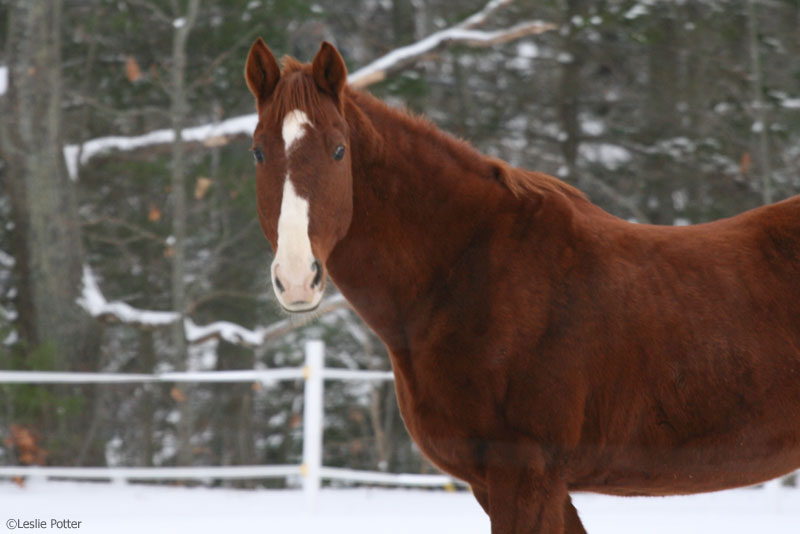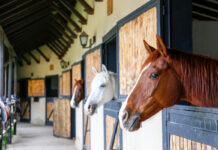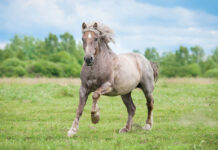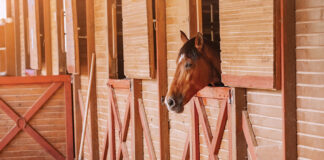Winter is setting in, and while you may be tempted to wrap your horse in an overly toasty warm blanket and tuck him in to a heated barn for the cold season, avoid the urge. He’s better off if you refrain from too much over-coddling. Of course throwing him out for the winter and forgetting about him until the spring thaw isn’t the way to go either. Read on to learn about horsekeeping winter mistakes.

Ensure your horse stays healthy all season long by using common sense and avoiding these Top 10 winter horsekeeping mistakes:
Letting his water freeze over.
The first horsekeeping winter mistake that horse owners make is letting their horse’s water freeze over. A horse will not stay properly hydrated if his water is frozen. Snow and ice are no substitute for clean, unfrozen drinking water. Your horse’s risk of impaction colic is greatly increased if he doesn’t have access to unfrozen water at all times. If you live in a region that experiences below-freezing temperatures, invest in a heating device specifically designed for horse waterers and troughs.
Not increasing feed rations when temperatures dip.
Talk to your veterinarian about how much feed your horse should receive during the winter months. As the temperatures drop, your horse burns more calories to stay warm. For some horses, this means considerable weight loss. If your horse isn’t on a calorie-restricted diet, consider increasing his hay rations as it gets colder outside. Forage (hay) provides an excellent source of calories. Also, the process of digesting fiber (most hays are high in fiber) helps keep a horse warmer.
No exercise.
The next horsekeeping winter mistake that horse owners make is no exercising their horses. Just like we humans, horses need exercise all year long, even when it’s cold outside! If possible, continue riding through the winter months. If severe conditions make winter riding impossible, turn your horse out daily in a large pasture or paddock daily; if it’s safe to do so, consider longeing him to keep him fit.
Overriding an out of shape horse.
If you only ride when the weather is good, chances are you won’t be doing much saddling up if you live in a cold winter region. That’s ok if you do other things to keep your horse fit, but if he’s a stable potato most of the season, use caution: An out-of-shape horse is at a much greater risk of musculoskeletal injury if exercised hard. If your winter riding schedule is sporadic, based on weather conditions, stick to lighter workouts that won’t over task your horse. Gradually increase his exercise level as his fitness improves.
Sequestering a horse indoors.
Horses will stay healthier and fitter if left outdoors for the winter, with a few caveats: All horses must have shelter from the elements. A three-sided shelter with a roof is a must. If you do bring your horse indoors, try to leave him out during the day and only bring him in at night. And don’t close your barn up! Instead, leave it open to ensure good airflow inside; a closed-up barn leads to poor air quality that can affect a horse’s respiratory health.
Over blanketing.
When it’s snowing outside and you’re inside enjoying a warm dinner by the fire, it’s hard not to feel sorry for your horse. To ease the guilt, you may be tempted to rush out and pile yet another blanket on him. Stop yourself right there! Yes, a horse with a full or partial body clip does need blanketing during winter, regardless of whether he’s kept indoors or out. But a horse with his natural winter coat probably doesn’t need blanketing as long as he has shelter from the elements, is receiving proper nutrition and is in good health. Over blanketing a horse can cause him to overheat, which can lead to dehydration and a host of health problems. If you are concerned about your horse’s comfort during winter, talk to your veterinarian about it.
Lack of hoof care.
The next horsekeeping winter mistake that horse owners make is the lack of hoof care. Nothing irks a good farrier more than an owner who insists on foregoing hoof care during the winter months. Horses—barefoot or shod, ridden or not—need regular farrier care every six to eight weeks, maybe even more often, regardless of the season. Period, the end!
No beauty treatment.
Even if you don’t ride during the winter, groom your horse regularly—daily if possible. Regular grooming and handling provides the opportunity to evaluate your horse and alerts you to problems such as illness, injury, weight loss, lost shoe, cracked hooves, et cetera. It’s up to us, as owners, to intervene as quickly as possible when something is wrong. Catching a problem early on helps put your horse back on the track to good health.
Throwing him out to pasture and forgetting about him.
There’s an old cowboy adage out there, “no rest for the horseman.” Yes, the holidays are upon us, and yes it’s darn cold outside, but you still have to keep up on your daily horsekeeping chores. Even if your horses are in pasture, you still have lots of work to do! Watering, feeding, grooming, exercising—get busy.
Neglecting your own health.
The tenth horsekeeping winter mistake that horse owners make is neglecting your own health. Most of us are responsible horse people who put equine health in front of our own. But remember, if you’re not healthy, you won’t be able to care for your horse. When tending to your horsekeeping tasks this winter, stay warm, stay safe and stay healthy because there’s someone counting on you every day.
Further Reading
The Big Chill
Horse Warmth in Winter






Thanks for all of the tips! They’re Great!
thanks! Great article.
This was a good article!
thanks this is gonna help alot when i get my horse!
These are great tips thanks!!!!
I am glad to see these, I think I was making the mistake “over ridding an out of shape horse” my horse will be glad to have that mistake fixed!
Well I have problems with 1 and 10. But I do give him new water several times a day. And he will drink freezing water with no problem.
I love tips like these. They are great.
Very good.
A very useful, “User Friendly” article, with simple constructive advise. Thank you 🙂
Great tips!
Great info for our equine friends during winter months!!
Really good information.
Wow, I noticed that I am doing some of this stuff. I will really try to stop. Thnx for the article
the best article i have read so for and i have read lots
This is good information, but one item is in direct conflict with a report I read just yesterday which said that brushing a horse in the cold weather can interfere with their ability to keep warm when the temps really tank. “Hairs of the coat are covered with a greasy substance, which helps the horse not to get wet to the skin on rainy or snowy days. The coat has a water-repelling effect through the hair grease — water runs down the outer hair while the deeper coat remains dry. The longer the coat, the less chance water has to get to the skin. Through regular coat brushing the greasy substance gets removed, and the water-repelling effect gets impaired.” http://www.academialiberti.de/en/articles/read/22/Thermoregulation-in-horses-in-a-cold-time-of-year/
Patty, I read the article about Thermoregulation in horses that you provided the link to which states that brushing a horse regularly can strip the hair of it’s natural water-repellant oils which naturally protect a horse from wet and cold. Great link- thank you. I’ve also read that if you do blanket a horse you should groom regularly to stimulate blood flow and to prevent skin issues that blanketing can contribute to. But, what about those of us who groom regularly because we ride regularly, even throughout the cold, winter months? Are we stripping our horses of their naturally protective oils to prevent wet skin which leads to shivering horses? (I’ve seen my horses shiver uncontrollably from getting wet on cold days. I felt awful and immediately bought water-proof sheets!) If so, perhaps we should consider water-proof sheets for those cold, WET nights. Something more to think about. I agree that over-blanketing a horse leads to problems… and we certainly don’t want to overheat our horses and cause dehydration, which leads to more problems! Perhaps we need to arm ourselves with knowledge and observation and make the bets choices we know how based on those. Food for thought.
Feeding high calorie feed, that takes a bit longer to digest, will help when the temperature get way below zero. Now with a round bale feeder, horses can eat more as needed.
informative article
great info
without blanketing or at least a rain sheet a horse should have some type of shelter in temps below 20 degrees? No hay in the pasture means no constant heating without shelter or blanket? no water in a tub and frozen stream means risk of colic? Can’t help but see three horses in neighbors pastures without these to help them on these zero degrees nights. I just threw two blaes of hay over my fence for them. Can’t hurt ?
I absolutely love this article! It made me feel so good about my care for my horse..as I read each paragraph twice with a smile saying to myself “you do all this” thank you for writing it!
No. 8 is bull. Dirt and oil on the natural winter coat helps keep the animal warm and dry. Keep them outside with a shelter from freezing rain, don’t stall them, blanket them or exercise them and they will be fine. Mustangs survived for millenia without any of that stuff and they’re fine. All I* do with mone in the w2inter is feed them and keep the stock tank free of ice, that’s all, I’ve never had any problems in 40 years, up to 25 horses at a time.
We have always followed these steps and have always had to argue a few of these with other horse people. Thanks for sharing!
Barbara, a coat that is covered in mud cannot fluff up to keep your horse warm. Mustangs have not survived for “millennia”. Centuries, not millennia. They are also subject to natural selection. If they can’t handle the elements, they die and don’t reproduce. Our modern horses are selectively bred. If they can’t handle the elements they get thrown inside and blanketed. So if you breed horse that never inherited the adaptations necessary to be okay to be thrown out in a pasture, that resulting foal may wind up with and owner who does through it out into the pasture. It may survive, but it may not thrive. You cannot compare the modern day, selectively bred horse to mustangs that are subject to natural selection as justification for not giving them proper winter care.
I found it very informative. I am guilty of the closed barn and blanketing. Changes will be made. Thank you for the information
Very good, especially #7. Living with a farrier I never stop hearing how owners neglect the feet,NOT only in winter but all year long!!! An article needs to be put out there stressing the fact that horses who’s feet are not taken care of will not be healthy enough to keep a shoe on,will split/crack among other things. Stop blaming the farrier for your neglect the farrier can only try to fix what you let go.There is a tool most of us call a HOOF PICK, designed to clean the foot of a horse, use it several times a week. It will help improve the health of your horses feet..
Actually I feel very conflicted over #7. Our farrier says during winter months call 10-12 weeks for shoes. There hooves don’t grow as fast in the cold winter, therefor they need LESS farrier time. Also, I rarely blanket my 9 year old QH, we only blanket him with a rain sheet when its pouring and a medium heavy blanket when it freezes bad, or is snowing.
I have a senior horse that was weak and was barely able to stay on her feet. She had lost her appetite. After some coaxing and TLC, she slowly stood up. We shielded off an area close to the house, watched her through the night and shielded her from the cold, damp north wind. The next morning she started to eat. Small amounts at first. Then gradually more. A week later she is doing much better. Your article was right on time. I plan on purchasing a waterproof blanket to help get her through the winter, but was not sure about fabrics, etc. After reading your information, I will be ordering one in the morning!
It’s great that you mentioned keeping horses outside during the day and only putting them indoors during the night. That should ensure a nice balance for them so that they can keep healthy and get the exercise they need. I’m planning on raising a few horses here on our property and wasn’t sure how I should go about getting a shelter for them. I’ll be sure to look for a pre-manufactured horse shelter that matches your description of having three sides covered so they’re protected from the elements especially during winter. Your article is a big help, thanks.